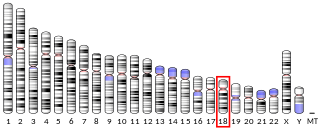
Heat shock 70 kDa protein 8 also known as heat shock cognate 71 kDa protein or Hsc70 or Hsp73 is a heat shock protein that in humans is encoded by the HSPA8 gene on chromosome 11. As a member of the heat shock protein 70 family and a chaperone protein, it facilitates the proper folding of newly translated and misfolded proteins, as well as stabilize or degrade mutant proteins. Its functions contribute to biological processes including signal transduction, apoptosis, autophagy, protein homeostasis, and cell growth and differentiation. It has been associated with an extensive number of cancers, neurodegenerative diseases, cell senescence, and aging.

Human gene HSPA1B is an intron-less gene which encodes for the heat shock protein HSP70-2, a member of the Hsp70 family of proteins. The gene is located in the major histocompatibility complex, on the short arm of chromosome 6, in a cluster with two paralogous genes, HSPA1A and HSPA1L. HSPA1A and HSPA1B produce nearly identical proteins because the few differences in their DNA sequences are almost exclusively synonymous substitutions or in the three prime untranslated region, heat shock 70kDa protein 1A, from HSPA1A, and heat shock 70kDa protein 1B, from HSPA1B. A third, more modified paralog to these genes exists in the same region, HSPA1L, which shares a 90% homology with the other two.

Heat shock 70 kDa protein 4 is a protein that in humans is encoded by the HSPA4 gene.

Mitochondrial 70kDa heat shock protein (mtHsp70), also known as mortalin, is a protein that in humans is encoded by the HSPA9 gene.

STUB1 is a human gene that codes for the protein CHIP.

Hsc70-interacting protein also known as suppression of tumorigenicity 13 (ST13) is a protein that in humans is encoded by the ST13 gene.

Heat shock 70 kDa protein 1L is a protein that in humans is encoded by the HSPA1L gene on chromosome 6. As a member of the heat shock protein 70 (Hsp70) family and a chaperone protein, it facilitates the proper folding of newly translated and misfolded proteins, as well as stabilize or degrade mutant proteins. Its functions contribute to biological processes including signal transduction, apoptosis, protein homeostasis, and cell growth and differentiation. It has been associated with an extensive number of cancers, neurodegenerative diseases, cell senescence and aging, and Graft-versus-host disease.

ETS translocation variant 1 is a protein that in humans is encoded by the ETV1 gene.

DnaJ homolog subfamily B member 6 is a protein that in humans is encoded by the DNAJB6 gene.

Heat shock 70 kDa protein 14 also known as HSP70-like protein 1 or heat shock protein HSP60 is a protein that in humans is encoded by the HSPA14 gene.

UBX domain-containing protein 11 is a protein that in humans is encoded by the UBXN11 gene.

Protein ZNF365 is a protein that in humans is encoded by the ZNF365 gene.

1-acylglycerol-3-phosphate O-acyltransferase ABHD5, also known as comparative gene identification-58 (CGI-58), is an enzyme that in humans is encoded by the ABHD5 gene.

Arginine vasopressin-induced protein 1 is a protein that in humans is encoded by the AVPI1 gene.

Serine/threonine-protein phosphatase 4 regulatory subunit 1 is an enzyme that in humans is encoded by the PPP4R1 gene.

Solute carrier family 52, member 3, formerly known as chromosome 20 open reading frame 54 and riboflavin transporter 2, is a protein that in humans is encoded by the SLC52A3 gene.

CKLF like MARVEL transmembrane domain-containing 7, previously termed chemokine-like factor superfamily 7, is a protein that in humans is encoded by the CMTM7 gene. This gene, which is located in band 22 on the short arm of chromosome 3, and the protein that it encodes belong to the CKLF-like MARVEL transmembrane domain-containing family. Through the process of alternative splicing, the CMTM7 gene encodes two isoforms, CMTM7-v1 and CMTM7-v2, with CMTM7-v1 being the main form expressed and studied. CMTM7 proteins are widely expressed in normal human tissues.

CKLF-like MARVEL transmembrane domain-containing protein 3, also termed chemokine-like factor superfamily 3, is a member of the CKLF-like MARVEL transmembrane domain-containing family of proteins. In humans, CMTM2 protein is encoded by the CMTM3 gene located in band 22.1 on the long arm of chromosome 16. This protein is expressed in a wide range of tissues, including fetal tissues. It is highly expressed in the male reproductive system, particularly testicular tissues and may play a role in the development of this tissue. It is also highly expressed in the immune system including circulating blood cells, i.e. B lymphocytes, CD4+ T lymphocytes, and monocytes. However, CMTM3 protein is weakly expressed or unexpressed in the malignant tissues of several types of cancers. In many but not all of theses cancers, this decreased or lack of expression appears due to methylation of the GpC islands in the promoter region, and thereby the silencing, of the CMTM3 gene.

Mediator complex subunit 19 (Med19) is a protein that in humans is encoded by the MED19 gene.

Calcium/calmodulin dependent protein kinase IG is a protein that in humans is encoded by the CAMK1G gene.


















